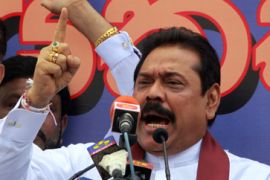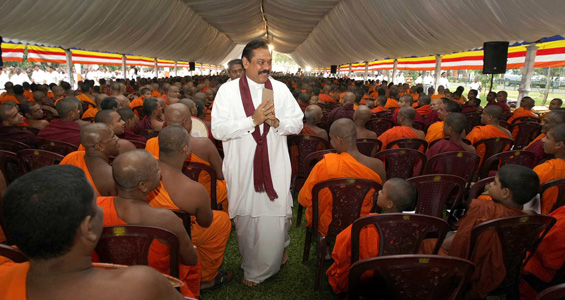Profile: Mahinda Rajapaksa
He is the president who presided over the crushing defeat of the Tamil Tigers.

 |
| Rajapaksa came to power in 2005 with the promise that he would defeat ‘terrorism’ [EPA] |
President Mahinda Rajapaksa oversaw the crushing military defeat of the Liberation Tigers of Tamil Eelam (LTTE) in May 2009.
The victory was a crowning moment for Rajapaksa, who came to power in 2005 pledging to defeat terrorism and bring peace to the country. He had the support of pro-Sinhalese, nationalist political parties.
Having made some token gestures toward the peace process, the president wasted no time in abrogating the ceasefire and launching a ‘do or die’ offensive against the Tigers in 2006.
The military push came in response to the Tigers shutting off vital water supplies to Sinhalese farmers in the East of the country.
For the president and his troops this was the start of the final offensive which ended in May 2009 – with the Tiger chief and his top leaders killed and the organisation in tatters.
Personal charm
Ending the war boosted Rajapaksa’s popularity, especially among the majority of the rural masses who credit him with having saved the country from the clutches of the Tigers who demanded a separate state.
His personal charm and charisma has won over many.
| in depth | |||||||||||||
|
In January 2010 he won the national election, becoming president for a second time.
But war came at a price. Over 25,000 soldiers have been killed in the 26-year conflict – around 5,000 of them in the last two years of fighting. There have been allegations that the Rajapaksa government and the Tigers violated the no-fire zone declared for civilians in the last stage of fighting with tens of thousands of ordinary Tamils caught in the cross fire.
The president and his government has drawn criticism at home and abroad for violating human rights, crushing dissent and effectively gagging the media – charges they have dismissed.
Rajapaksa caught the West by surprise with his victory over the Tigers – a group that had cultivated the image that it was unbeatable.
Rajapaksa won praise and admiration for standing up to the West in the face of intense pressure to declare a truce and negotiate, especially during the final stage of fighting.
He often played the nationalist card, alluding to international conspiracies to weaken and divide the country.
In the face of closing Western doors, he turned to China, Iran and even Libya for support in the increasingly expensive war.
Veteran politician
Sri Lanka’s fifth executive president, Rajapaksa is a wily political fighter who has 40 years political experience under his belt.
He comes from a family of politicians from the Southern heartland of Sri Lanka in the Hambantota District and in 1970 at the age of 24 became the youngest Sri Lankan to be elected to parliament.
Keeping with family tradition he joined the Sri Lanka Freedom Party, the main party of the ruling alliance.
He was an active campaigner for human, labour and trade union rights and served as chairman of the Sri Lanka Committee for Solidarity with Palestine for 30 years.
| SRI LANKA IN DEPTH | ||||||||||||

|
The mid 1980s were difficult times for opposition parties and Rajapaka was imprisoned for three months on allegations of possessing an illegal firearm during a by-election in the South.
His experience and political acumen has helped him keep the ruling alliance together – albeit with one of the world’s biggest administrations consisting of 50 ministers, 36 non-cabinet ministers and 21 deputy ministers.
Despite winning accolades for leading the victory over terrorism, the president has been a target for criticism in a number of spheres.
Nepotism is one of those – four of the six Rajapaksa brothers serve in government and three of them, including the president, reportedly control up to 70 per cent of the national budget.
A number of siblings, close relatives and associates also hold key positions within the state apparatus.
Corruption, as in many parts of post-colonial Asia, is rampant. The government is yet to take any concrete measures to address this phenomenon.
The current president has launched a wave of development ranging from large scale infrastructure projects to revitalising the agriculture sector. A number of these have been tainted by allegations of kickbacks and corruption.
New mandate
With the war over, the Rajapaksa government had come under increasing pressure to address major issues that have taken a backseat during the conflict. People have become frustrated with the soaring cost of living.
In what is seen as a bid to capitalise on the goodwill which followed the victory over the Tamil Tigers, Rajapaksa called a snap presidential election – two years ahead of schedule.
He says his first term concentrated on ending the war and he now wants a mandate to secure the peace and ensure development.
The hawkish, pro-Sinhala stance adopted by the president has now given way to a more conciliatory tone aimed at winning over the minority Tamil population.
Tamils in the North and East boycotted the 2005 presidential poll, which many see as a deciding factor in Rajapaksa’s victory by less than 200,000 votes.
Son of the soil
A lawyer by profession, Rajapaksa has a carefully cultivated image of being a southern son of the soil.
He wears traditional national dress and is hardly ever seen without his trademark maroon shawl – adopted from an uncle, a state counsel, who wore a brown shawl to represent pulses cultivated by people of his area
The president is married to a former beauty queen, Shiranthi Wickramasinghe. They have three sons. Despite his busy schedule the president is known to take an active interest in their activities. He is often seen at rugby tournaments (sometimes watching with binoculars from a nearby building due to security concerns) where his sons are playing.
Despite his charm and characteristic smile Rajapaksa does not tolerate those he considers to have betrayed him – of which his reaction to Sarath Fonseka’s candidacy in the 2010 presidential race is proof.
Rajapaksa was inaugurated into his second presidential term on November 19, 2010.

